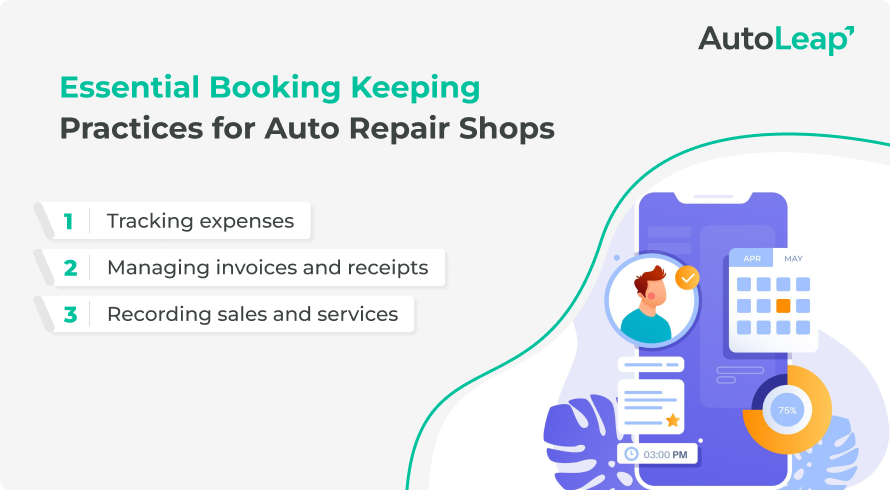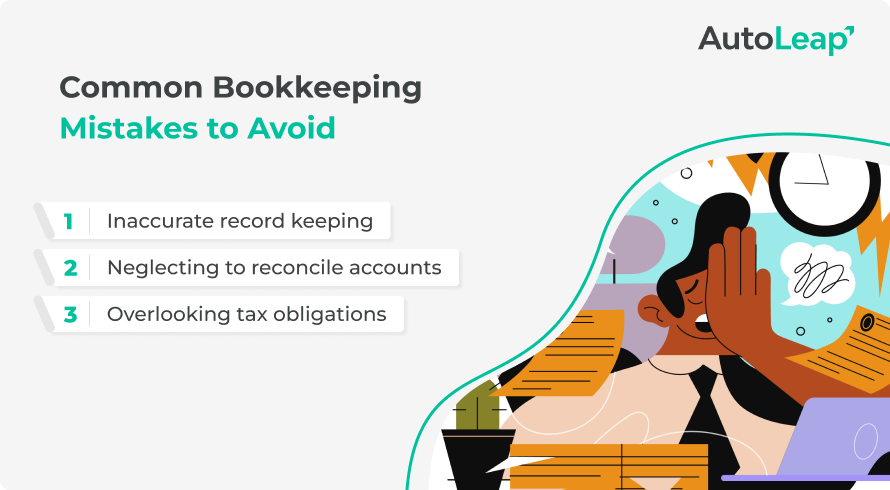When did you last look at your auto repair shop’s finances? Bookkeeping for auto repair shops might not be the glamorous part of running a business, but it’s essential. Without proper bookkeeping, you might as well be driving blind on a busy highway. In this blog, we’ll break down the basics, share tips on setting up your system, and highlight common mistakes to avoid—all in a way that’s easy to understand and even a little bit fun.
Let’s understand the basics of bookkeeping
Schedule a free demo today!

Boost your shop sales

Simplify shop management

Empower your technicians
What is bookkeeping, and why does it matter?
Bookkeeping is the process of recording and organizing your business’s financial transactions. It’s the foundation of your financial health, giving you a clear picture of where your money is coming from and where it’s going. Think of it as your shop’s financial GPS. Without it, you might make wrong turns or run out of gas (aka cash).
Proper bookkeeping allows you to:
- Make informed decisions about your business.
- Keep track of expenses and income.
- Prepare for taxes without the last-minute scramble.
- Avoid financial pitfalls that could put your shop in the red.
Key bookkeeping terms
Before diving deeper, let’s clarify some key terms:
- Assets: What your shop owns (e.g., equipment, inventory, cash).
- Liabilities: What your shop owes (e.g., loans, unpaid bills).
- Revenue: The money your shop earns from services and sales.
- Expenses: The costs of running your shop (e.g., rent, parts, utilities).
- Equity: The value of your shop after liabilities are subtracted from assets.
How to set up your bookkeeping system
Manual vs. software solutions
Setting up your bookkeeping system is like choosing between manual tools and power tools in your garage. You can get the job done with a wrench, but a power tool makes it faster and easier. Similarly, you can manage your bookkeeping with a notebook and calculator, but bookkeeping software streamlines the process.
Manual bookkeeping:
- Pros: It is low cost, and there is no need for tech skills.
- Cons: It can be time-consuming, with a higher risk of errors.
Bookkeeping software:
- Pros: Saves time, reduces errors, automates repetitive tasks.
- Cons: Initial cost, learning curve.
Most shop owners find that software is worth the investment for the time and headaches it saves.
Choosing the right software
Not all bookkeeping software is created equal. When choosing the best accounting software for auto repair shops, consider the following:
- Cost: Make sure it fits your budget.
- Usability: Choose something you and your team can easily use.
- Features: Look for software that includes invoicing, expense tracking, and integration with other tools you use.
Popular choices like QuickBooks are designed for small businesses and come with features tailored to auto repair shops. But remember, the best accounting software for your auto repair shop is the one that meets your specific needs.
Essential booking keeping practices for auto repair shops

Tracking expenses
You wouldn’t leave a toolbox open with tools scattered everywhere, right? Similarly, you must systematically track all your operational expenses, from parts purchases to payroll. Use your software to categorize expenses, making it easier to see where your money is going and where you might be able to cut costs.
Managing invoices and receipts
Invoices and receipts are the lifeblood of your cash flow. Keeping them organized helps you manage your income and prepare for tax season. Create a system to store these documents by date and type. This practice will save you time and reduce stress during tax season.
Recording sales and services
Every time you complete a repair or sell a part, it should be recorded in your books. This practice ensures that your revenue is accurately tracked, and that you have a clear picture of your shop’s financial performance.
Common bookkeeping mistakes to avoid

Inaccurate record keeping
It’s easy to let things slide when you’re busy, but inaccurate record-keeping can lead to serious issues. Always double-check your entries and reconcile your accounts regularly.
Neglecting to reconcile accounts
Reconciling your accounts—comparing your book records with your bank statements—should be a regular task. This process helps you catch discrepancies early and ensures your records are accurate.
Overlooking tax obligations
Taxes can sneak up on you if you’re not careful. Set aside funds for tax liabilities throughout the year to avoid scrambling for cash when payments are due.
Year-end bookkeeping tasks
As the year ends, your bookkeeping tasks take on new importance. Think of this as your shop’s annual check-up.
- Inventory checks: Make sure your inventory records match what’s on your shelves.
- Assess accounts receivable: Follow up on unpaid invoices to keep your cash flow healthy.
- Prepare for tax filing: Organize all your financial records now to make tax season as painless as possible.
Closing thoughts
Keeping your books in order gives you a clearer view of your auto repair shop’s financial health, enabling you to steer your business toward success. And remember, whether you’re just starting out or looking to improve your current system, the right tools and practices can make all the difference.









